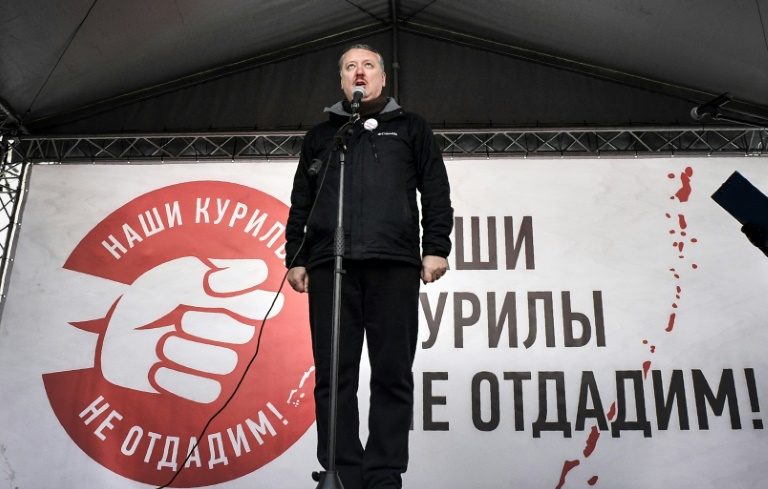SOCIAL
Russia accuses nationalist blogger, ex-separatist commander of extremism

Igor Strelkov, former top military commander of the self-proclaimed ‘Donetsk People’s Republic’, makes a speech in Moscow on January 20, 2019 – Copyright AFP/File Kazuhiro NOGI
Russia on Friday opened a case for extremism against former separatist commander and nationalist military blogger Igor Girkin, a hawkish commentator who criticised Russia’s leadership.
Girkin — better known by his alias Igor Strelkov — is a supporter of the offensive but also vocally criticised its conduct on the messaging app Telegram, where he was followed by around 875,000 people.
By opening this case against him, authorities signal that any criticism — even from supporters of the military operation in Ukraine — are off-limits in the aftermath of the Wagner mercenary group’s short-lived rebellion.
Girkin appeared in a glass cage at a Moscow court around which dozens of supporters peacefully gathered, AFP saw.
A message on social media from Girkin’s wife Miroslava Reginskaya first said he had been detained for extremism, which court documents later confirmed.
He is facing the charge of “public calls for extremism”, which could see him imprisoned for five years.
A former military commander of the Donetsk People’s Republic, 52-year-old Girkin was one of the key figures in the pro-Kremlin insurgency when fighting broke out in eastern Ukraine in 2014.
In 2022, he was one of three men sentenced by a Dutch court to life imprisonment over the downing of Malaysia Airlines flight MH17 over Ukraine in 2014.
In recent years Girkin has become one of the most vocal critics of Putin, and most recently of the way in which Russia’s offensive in Ukraine has been conducted.
– ‘Crossed all red lines’ –
In one of his most recent posts Girkin urged power to be handed to a successor.
“The country will not survive another six years of this cowardly mediocrity in power,” he wrote on Telegram.
Independent political analyst Tatiana Stanovaya said Girkin had “long crossed all possible red lines”.
But his detention comes around a month after the attempted mutiny by the mercenary group Wagner, from which the Kremlin emerged visibly weakened.
Prigozhin was the most strident voice for those inside Russia criticising failures in the invasion and the strategies used by Defence Minister Sergei Shoigu and army chief Valery Gerasimov.
Strelkov denounced Prigozhin’s muntiny but kept on criticising the incompetence of Russia’s conventional military commanders.
The case against Girkin “is one of the consequences of Prigozhin’s rebellion: the army received more political opportunities to suppress its opponents in the public space,” Stanovaya said.
She did not expect mass arrests but said, “The most radical ones may be prosecuted, so that the rest will be more careful.”
Criticism of Russia’s assault on Ukraine has been outlawed and all key liberal opposition figures are either behind bars or in exile.
SOCIAL
Snapchat Explores New Messaging Retention Feature: A Game-Changer or Risky Move?

In a recent announcement, Snapchat revealed a groundbreaking update that challenges its traditional design ethos. The platform is experimenting with an option that allows users to defy the 24-hour auto-delete rule, a feature synonymous with Snapchat’s ephemeral messaging model.
The proposed change aims to introduce a “Never delete” option in messaging retention settings, aligning Snapchat more closely with conventional messaging apps. While this move may blur Snapchat’s distinctive selling point, Snap appears convinced of its necessity.
According to Snap, the decision stems from user feedback and a commitment to innovation based on user needs. The company aims to provide greater flexibility and control over conversations, catering to the preferences of its community.
Currently undergoing trials in select markets, the new feature empowers users to adjust retention settings on a conversation-by-conversation basis. Flexibility remains paramount, with participants able to modify settings within chats and receive in-chat notifications to ensure transparency.
Snapchat underscores that the default auto-delete feature will persist, reinforcing its design philosophy centered on ephemerality. However, with the app gaining traction as a primary messaging platform, the option offers users a means to preserve longer chat histories.
The update marks a pivotal moment for Snapchat, renowned for its disappearing message premise, especially popular among younger demographics. Retaining this focus has been pivotal to Snapchat’s identity, but the shift suggests a broader strategy aimed at diversifying its user base.
This strategy may appeal particularly to older demographics, potentially extending Snapchat’s relevance as users age. By emulating features of conventional messaging platforms, Snapchat seeks to enhance its appeal and broaden its reach.
Yet, the introduction of message retention poses questions about Snapchat’s uniqueness. While addressing user demands, the risk of diluting Snapchat’s distinctiveness looms large.
As Snapchat ventures into uncharted territory, the outcome of this experiment remains uncertain. Will message retention propel Snapchat to new heights, or will it compromise the platform’s uniqueness?
Only time will tell.
SOCIAL
Catering to specific audience boosts your business, says accountant turned coach

While it is tempting to try to appeal to a broad audience, the founder of alcohol-free coaching service Just the Tonic, Sandra Parker, believes the best thing you can do for your business is focus on your niche. Here’s how she did just that.
When running a business, reaching out to as many clients as possible can be tempting. But it also risks making your marketing “too generic,” warns Sandra Parker, the founder of Just The Tonic Coaching.
“From the very start of my business, I knew exactly who I could help and who I couldn’t,” Parker told My Biggest Lessons.
Parker struggled with alcohol dependence as a young professional. Today, her business targets high-achieving individuals who face challenges similar to those she had early in her career.
“I understand their frustrations, I understand their fears, and I understand their coping mechanisms and the stories they’re telling themselves,” Parker said. “Because of that, I’m able to market very effectively, to speak in a language that they understand, and am able to reach them.”Â
“I believe that it’s really important that you know exactly who your customer or your client is, and you target them, and you resist the temptation to make your marketing too generic to try and reach everyone,” she explained.
“If you speak specifically to your target clients, you will reach them, and I believe that’s the way that you’re going to be more successful.
Watch the video for more of Sandra Parker’s biggest lessons.
SOCIAL
Instagram Tests Live-Stream Games to Enhance Engagement

Instagram’s testing out some new options to help spice up your live-streams in the app, with some live broadcasters now able to select a game that they can play with viewers in-stream.
As you can see in these example screens, posted by Ahmed Ghanem, some creators now have the option to play either “This or That”, a question and answer prompt that you can share with your viewers, or “Trivia”, to generate more engagement within your IG live-streams.
That could be a simple way to spark more conversation and interaction, which could then lead into further engagement opportunities from your live audience.
Meta’s been exploring more ways to make live-streaming a bigger consideration for IG creators, with a view to live-streams potentially catching on with more users.
That includes the gradual expansion of its “Stars” live-stream donation program, giving more creators in more regions a means to accept donations from live-stream viewers, while back in December, Instagram also added some new options to make it easier to go live using third-party tools via desktop PCs.
Live streaming has been a major shift in China, where shopping live-streams, in particular, have led to massive opportunities for streaming platforms. They haven’t caught on in the same way in Western regions, but as TikTok and YouTube look to push live-stream adoption, there is still a chance that they will become a much bigger element in future.
Which is why IG is also trying to stay in touch, and add more ways for its creators to engage via streams. Live-stream games is another element within this, which could make this a better community-building, and potentially sales-driving option.
We’ve asked Instagram for more information on this test, and we’ll update this post if/when we hear back.
-

 WORDPRESS7 days ago
WORDPRESS7 days ago13 Best HubSpot Alternatives for 2024 (Free + Paid)
-

 MARKETING7 days ago
MARKETING7 days agoAdvertising in local markets: A playbook for success
-

 SEARCHENGINES7 days ago
SEARCHENGINES7 days agoGoogle Core Update Flux, AdSense Ad Intent, California Link Tax & More
-

 SEARCHENGINES5 days ago
SEARCHENGINES5 days agoGoogle Needs Very Few Links To Rank Pages; Links Are Less Important
-

 SEO5 days ago
SEO5 days agoHow to Become an SEO Lead (10 Tips That Advanced My Career)
-

 MARKETING6 days ago
MARKETING6 days agoHow to Use AI For a More Effective Social Media Strategy, According to Ross Simmonds
-

 PPC4 days ago
PPC4 days ago10 Most Effective Franchise Marketing Strategies
-

 SEARCHENGINES3 days ago
SEARCHENGINES3 days agoGoogle Won’t Change The 301 Signals For Ranking & SEO













